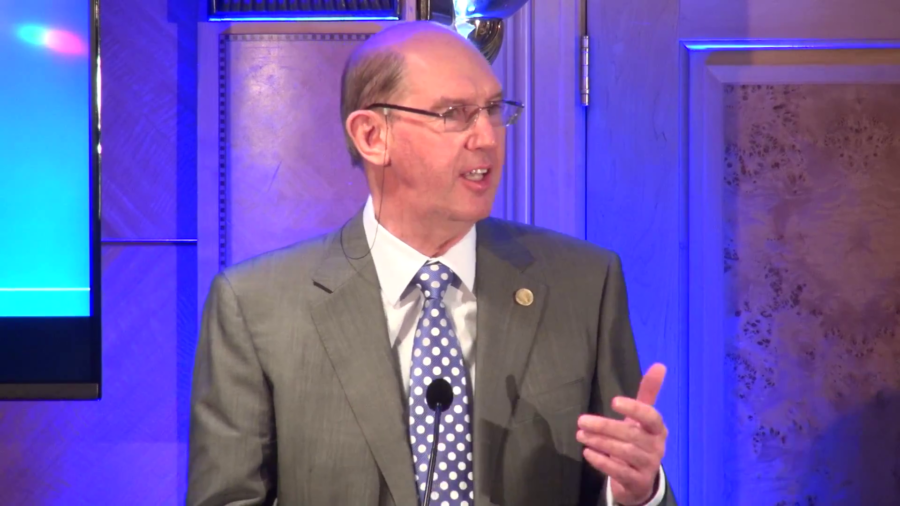Dennis Jennings: Thank you. Good evening. I’m delighted and really honored to be here. But before I tell you a bit about the past, let me tell you a bit about today. It’s some very interesting and exciting new news.
Last week the European Parliament passed an act enforcing net neutrality. And that’s a major step. It’s now up to the governments so we need to lobby the governments to make sure that they’re not lobbied by the telecoms industry to undermine this step. And this morning, the European Court of Justice overturned the Data Retention Directive in Europe— [light applause] Yes. Citing that the security does not trump personal privacy. And this whole directive has to be rewritten. At ISOC, we have a job to do to make sure that that’s rewritten properly. Now. Let me tell you a little— [applause] Yeah. I think this is important.
But anyway, back to the past. Twenty-nine years ago— I was involved in networking in the decade of the 80s. I was invited to join the National Science Foundation as the first program director for networking. I started on the first of January 1985, and I was on fifteen months leave of absence from University College Dublin. So I had this window of opportunity to do something.
Now, I was hired to build a supercomputer access network. or a set of networks for supercomputer access. The reason I took the job was that I saw an opportunity to do something much bigger in that.
So, with the benefit of hindsight, I’ll now express what I did in sort of the terms I would use nowadays. I’m no longer involved; I’m a venture capitalist, an angel investor, that sort of stuff.
So what I think I did was I took a long-term strategic approach to building the network, rather than a short-term tactical view. And that meant supporting the longer-term needs of all researchers in the United States, at their desktops, rather than only the supercomputer users at their supercomputers. That meant building a scalable network of networks—an internet—based on campus, regional, community, backbone networks; rather than a set of dedicated supercomputer access networks. And two of those had already been funded by the time I joined.
This meant changing the way the NSF itself approached the work I was trying to do. Normally, the NSF program directors sit and wait for interesting proposals. The approach I took was to define the mission, indeed to define the technology—it had to be an internet, it had to be TCP/IP, to mandate that TCP/IP would be used, (in some cases in due course), and inviting proposals to fill up those components of the network of networks.
This meant leveraging NSF funds by involving the research community and providing seed funding to enable those communities to build their own networks, and spend their own money doing so, rather than seeking a single contractor to build a network. Although, later on for the high-speed backbone that proved to be the best way of doing it.
And that meant my role was to provide leadership. To go out—and I spent the fifteen months going around the United States talking to people—and trying to excite people about the research network and about participating and contributing to this effort. And to find a way to accommodate the short-term battles (and they were intense) between the strategic view and the tactical view. And I had many public battles. When people pointed out that I was undermining the health of US research by going for a long-term strategic view for a technology that didn’t work very well (TCP/IP internet technology) rather than the short-term tactical MFENET or DECnet, which worked very well indeed.
And that’s why I think the NSFNET program was successful. My work was based on the vision and enthusiasm of many people who went before me. And indeed by the people who followed. In particular I want— The only person I’m going to mention my name is Steve Wolff, who took up the work and turned it into the NSFNET and the Internet we have today.
But, most importantly, my work was supported by the dozens, perhaps even hundreds of people, some of whom you’ve already recognized in the Internet Hall of Fame, some of whom are recognized today, who took up the challenge. These were research leaders, researchers, networkers. They took up the challenge. They put their own time and effort in. And they made the NSFNET program work. So, it’s on their behalf, all those people who actually did the hard work, that I’m very honored to be here to accept this award, and I thank you.
